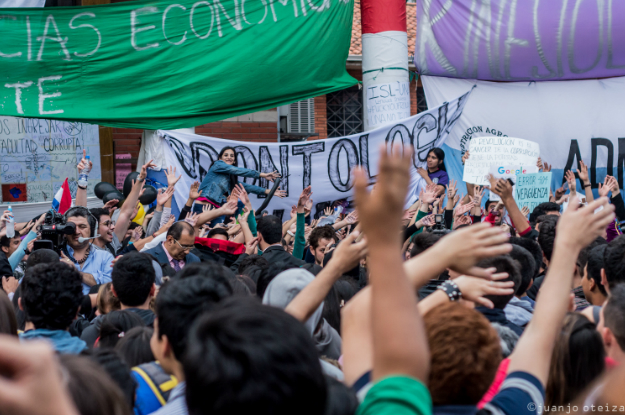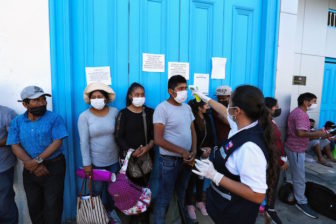Add Paraguay to the growing list of Latin American countries where citizen protests are successfully holding public officials accountable for alleged abuses of power. In the past month, a student-led response to revelations of corruption within Paraguay’s largest university has landed the institution’s highest official behind bars and disrupted the status quo in a country considered one of the region’s most corrupt.
Newly emboldened student activists tell AQ they won’t stop there and that they’re planning more efforts to encourage accountability in other areas of society and government.
“This student movement has awakened the Paraguayan youth,” says activist Emilio Cantero Almada.
University and high school students alike have taken to the streets en masse—a “historic” march in Asunción last month drew some 6,000 secondary students. Some attribute the students’ fervor to Pope Francis, who, while visiting Paraguay in July, encouraged young people to “hacer lío,” or “get in trouble.”
At the center of last month’s controversy was the National University of Asunción (UNA). In early September, the newspaper Última Hora published an investigation exposing a network of nepotism and graft at UNA run by Chancellor Froilán Peralta. The investigation accused Peralta of paying multiple or inflated salaries to friends and relatives. For example, Peralta employed his 21-year-old niece as his assistant, but also paid her as a professor—a perk that earned her six times the minimum wage.
The subsequent student backlash resulted in Peralta’s resignation and imprisonment, as well as the resignation of UNA’s vice-chancellor and of a growing number of deacons and vice-deacons. The country’s anti-corruption prosecutor continues to investigate hundreds of faculty members believed to be complicit in Peralta’s scheme.
According to activists who spoke with AQ, Peralta’s resignation came after student protesters took advantage of the same policy that had enabled such corruption to go unchecked. University autonomy—enshrined in Paraguay’s constitution and in those of most Latin American countries—requires that issues with university administration be resolved internally, ostensibly to prevent national politics from interfering in a school’s leadership and priorities. In the case of UNA, however, the procedure allowed the questionable dealings of university heads to go unaccounted for.
On September 21, students began an around-the-clock occupation of the chancellor’s office, preventing anyone from entering or exiting. In accordance with university autonomy, police could not enter the campus to impede students’ efforts. While Peralta was nowhere to be found, the students temporarily took more than 30 university board members hostage, as well as a woman who allegedly tried to leave campus with evidence of Peralta’s misdeeds. By the end of the week, Peralta had turned himself in to the district attorney’s office.
Liz Guillen, a student representative at UNA, says students have gained the support of wider Paraguayan society. “We’ve received many congratulations from the rest of society, and those [outside the university] gave us food and water during the occupation.”
Guillen is now working to organize groups at other schools to call for greater accountability. While such student activism isn’t new in Paraguay, some say the recent protests indicate a shift in thinking among young Paraguayans thanks to a movement for government transparency that gained steam in 2014. That push resulted in Paraguay becoming the 100th country worldwide to pass a freedom of information law, which requires that government salaries and contracts be made available to the public. Última Hora’s revelations to the public would have been unthinkable without the law.
“What we’re seeing now is different because students are finally outraged,” says Cantero, who was expelled from UNA in 2009 for trying unsuccessfully to mobilize students against university corruption. “There had always been the fear of reprisal keeping students from denouncing corruption.”
Taking the Pope’s rallying cry to heart, young Paraguayans boast a renewed motivation, encouraged by the swift actions of justice officials to investigate UNA leadership. President Horacio Cartes himself even appears on board, tweeting his congratulations.









